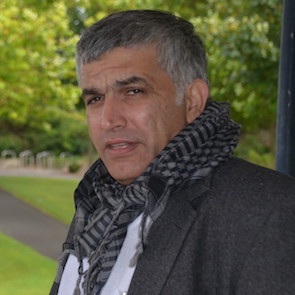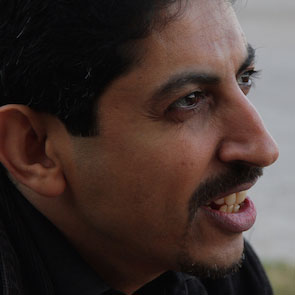Dublin Event Demands Release of Abdulhadi Al-Khawaja & Nabeel Rajab
Front Line Defenders and the Gulf Centre for Human Rights (GCHR) hosted a public gathering in Dublin in solidarity with the prominent human rights defenders, Abdulhadi Al-Khawaja and Nabeel Rajab, who are both imprisoned in Bahrain on fabricated charges related to their peaceful human rights activities.
On 12 April 2017, Abdulhadi Al-Khawaja began an open ended hunger strike, accepting only water, in protest of the degrading treatment against prisoners and the deteriorating conditions inside the prison coupled with ongoing arbitrary arrests and detentions, according to Al-Khawaja’s family. Resulting from previous hunger strikes, his health has already diminished significantly. One of these hunger strikes lasted for 110 days during which time he was force fed against his will. Al-Khawaja, who is a founding Director of GCHR, a former Front Line Defenders MENA Protection Co-ordinator, and also the founder and former President of the Bahrain Center for Human Rights (BCHR), is among a group of prisoners known as “the Bahrain 13”. These men were sentenced to prison in 2011 for their human rights and pro-democracy activities. He is serving a life sentence.
Nabeel Rajab, is also a GCHR founding Director, and suffering in jail. A day after undergoing surgery for a bleeding ulcer on his back on 05 April 2017, Rajab was returned to West Riffa police station, where he is held in solitary confinement. According to his family, after the surgery Rajab “was forced to lie in the bloodied clothes in which he was operated on, without being cleaned and denied any hygienic products or change of clothes for two days.” He has “a deep and open wound which causes severe pain and needs constant care, and worsening the situation is that he has a weakened immune system from pre-existing medical conditions and lack of adequate medical care.” On 08 April, he was rushed to the police hospital by ambulance, where he remains for treatment of his infected wound. He should not have been taken back to jail after surgery due to the ongoing risk of infection. Rajab is also the President of BCHR and Deputy Secretary General of FIDH.
Khalid Ibrahim, Executive Director of the Gulf Center for Human Rights, began the meeting, which comprised a panel of experts, by highlighting the hard work of Abdulhadi and Nabeel in defending human rights both inside and outside of Bahrain. He explained that the imprisonment of Abdulhadi was never the end of his human rights work, but conversely it gave more impetus to it. He added that Nabeel has been targeted on false charges solely due to his international renown as a distinguished human rights figure.
Andrea Rocca, Deputy Director of Front Line Defenders spoke about the exemplary efforts of Abdulhadi when he was the MENA Protection coordinator at Front Line Defenders and reminded us that his court case fell short of international standards for fair trial and due process. He also mentioned the targeting of Nabeel merely because of tweets criticising government policies.
Professor Damian McCormack talked about his visit to Bahrain as a member of the Irish Delegation in July 2011 and his meeting with Nabeel Rajab in Manama. He also referred to the multiple violations perpetrated against medical workers for upholding their Hippocratic Oath in treatment of peaceful demonstrators during the protests at that time, and administering medical care irrespective of the background of the injured people, as is the duty of those who adhere to the rules of medical neutrality. He made a public call for the medical evacuation of both Abdulhadi and Nabeel to receive the appropriate treatment in Ireland, where he can assist with their health care as a matter of immediate urgency due to the critical conditions that they are currently in.
The final panelist was Tara Reynor O’Grady of Human Rights Sentinel, who first read the statement issued by MEP Marian Harkin which was sent from Brussels and who supported Professor McCormack’s medical evacuation initiative, along with Professor Thomas Collins ex-President of RCSI in Bahrain, and Professor Eoin O’Brien of University College Dublin who had also accompanied the 2011 Irish Delegation to Bahrain. She also expressed the determined and continuing support of the Irish people for the right to self-determination for the people of Bahrain and mentioned the multiple practical achievements that have been made in partnership with many active NGOs and concerned governments.
The meeting concluded with a round of questions from the floor and answers which focussed on the possibility of a medical evacuation and other options to provide the necessary health care that both men so urgently need.


